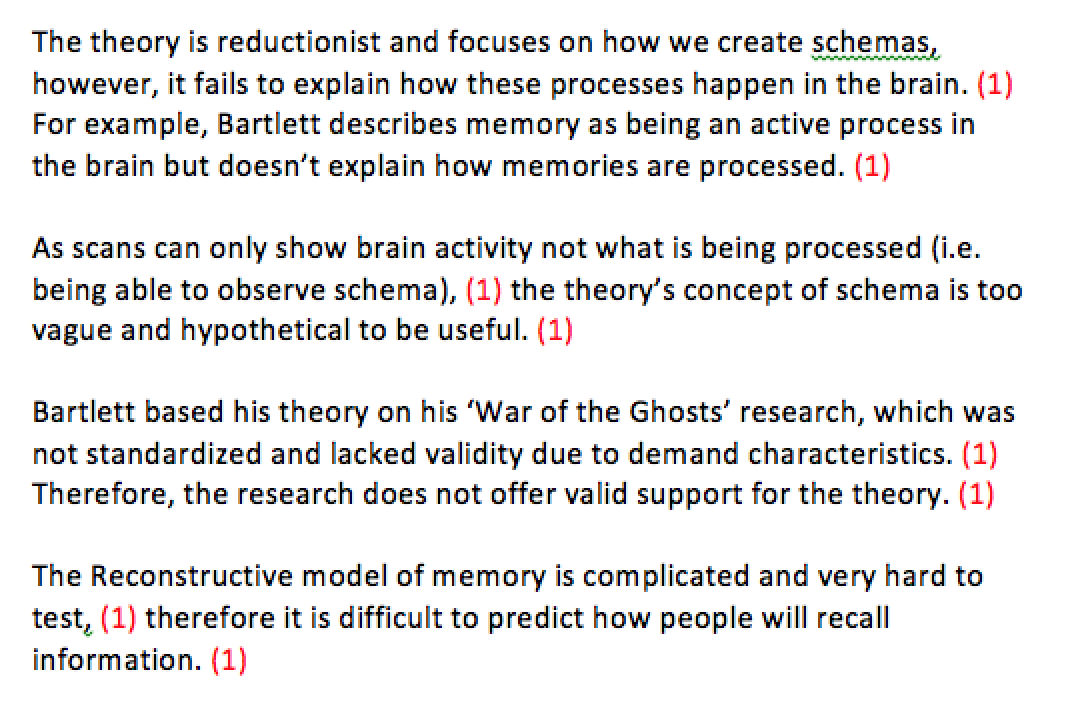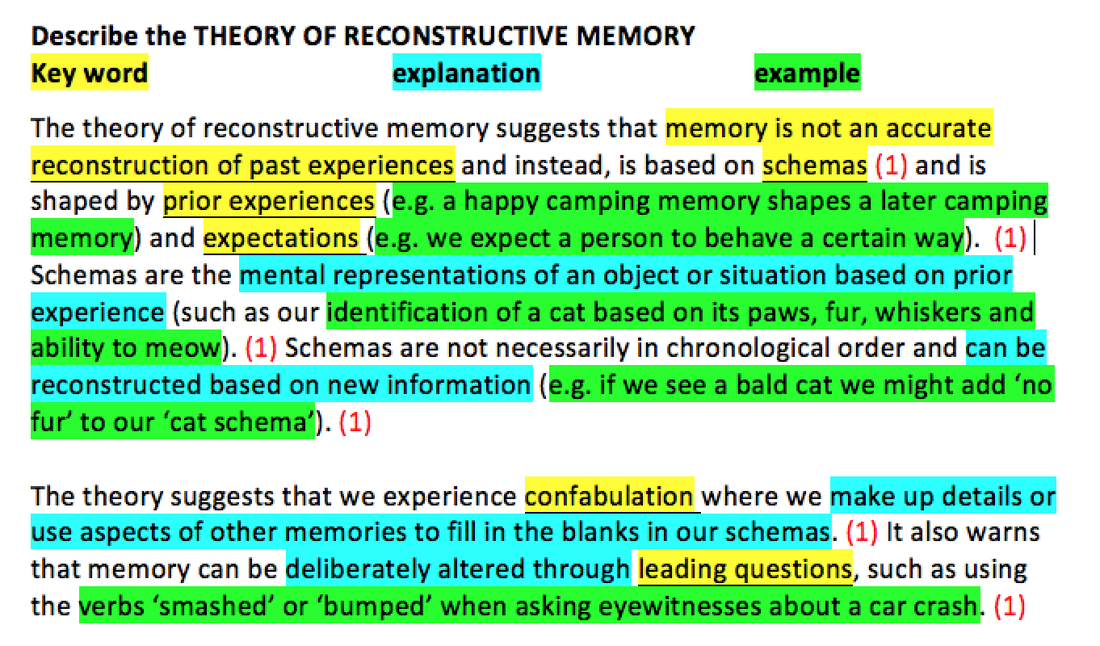What Is the Theory of Reconstructive Memory
The reconstructive model of memory does not predict how experiences or emotions can affect memories but simply gives principles of how reconstruction may work. The reconstructive memory model makes predicting behaviour difficult and a good explanation for memory should make prediction possible for it to have credibility.

Theory Of Reconstructive Memory Passmores Psychology Learning Hub
Recently my class worked on a take-home essay with the question Discuss research memory making referencing to one or more studies.

. Derives from common knowledge and schemas as well as memory in order to rebuild events in the subject s mind. Reconstructive memory is a theory of memory recall in which the act of remembering is influenced by various other cognitive processes including perception imagination semantic memory and beliefs amongst others. For example an interviewer may work with crime victim to assemble a memory of the traumatic events surrounding a crime.
Reconstructive memory refers to a class of memory theories that claim that the experience of remembering an event involves processes that make use of partial fragmentary information as well as a set of rules for combining that information into a coherent view of the past event. Abuse can be discovered through reconstructive. BARTLETT 1932RECONSTRUCTIVE MEMORY SCHEMAS.
Reconstructive Memory Reconstructive memory refers to the process of assembling information from stored knowledge when a clear or coherent memory of specific events does not exist. Up to 24 cash back Reconstructive Memory Bartlett Memory does not work like a video recording meaning that our memories of an event are often incomplete as we only recall the important points. Bartlett s theory of reconstructive memory is crucial to an understanding of the reliability of eyewitness testimony as he suggested that recall is subject to personal interpretation dependent on our learnt or cultural norms and values and the way we make sense of our world.
BRIEF SUMMARY OF THE THEORY. The reconstructive memory model of episodic future thinking in anxiety Miloyan Pachana et al 2014 suggests that the biased retrieval of information from memory in the process of imagining future events therefore shapes the affective and phenomenological characteristics of those imagined events. Many brain systems are involved in different memories.
Reconstructive memory is a theory of memory that states that memories consist not only of what it encodes and stores but of prior knowledge in the form of schemas. These theories provide a powerful way of understanding how witnesses remember crimes how. It doesnt faithfully play back our experiences.
When reading and giving feedback on their. Instead it changes or reconstructs them imaginatively. This post will give you some advice on how to avoid common errors.
Numerous studies have shown that our memories are reconstructive in nature and during this reconstructive process our memories are liable to be influenced by misinformation. Bartletts central insight was that memory is not like a tape recorder. KEY INFORMATION ON THE theory.
People view their memories as being a coherent and truthful account of episodic memory and believe that their perspective is free from an error. War of the ghosts story. Reconstructive memory is the process in which we recall our memory of an event or a story.
Schema is a pre-existing mental representation or expectation of something based on prior knowledge. That is to say memories can be altered by providing wrong information to someone which is later remembered and recalled with confidence. Reconstructive memory is a theory of memory recall in which the act of remembering is influenced by various other cognitive processes including perception imagination semantic memory and beliefs amongst others.
Many people believe that memory works something like a videotape. Reconstructive memory suggests that in the absence of all information we fill in the gaps to make more sense of what happened. Theory of reconstructive memory and eyewitness testimony Proposes that memory is an active process that involves the reconstruction of information rather.
Reconstructive memory is so powerful that it can affect an eyewitnesss testimony and change. Achieving remembrance by analytically reconstructing past events which are incomplete within the subject s memory. Bartlett s theory of reconstructive memory is crucial to an understanding of the reliability of eyewitness testimony as he suggested that recall is subject to personal interpretation dependent on our learnt or cultural norms and values and the way we make sense of our world.
Biological Basis of Memory a. Psychologist Federic Bartlett discovered was that as an event happens we dont perceive as much as we think. According to Bartlett we do this using.
Long-term semantic and episodic memories are probably stored in multiple places in and around the cerebral cortex HERA c. USEFUL WEBSITE on the THEORY. Reconstructive memory refers to recollections where we add or omits details from the original event.
Procedural memory is likely stored in the cerebellum 34. Reconstructive memory is a difficult topic to write about. Many brain systems are involved in different memories.
Up to 24 cash back In depth exploration of the Theory of Reconstructive Memory. This theory was proposed by Sir Frederick Bartlett one of the early figures in memory research. Reconstructive memory is a theory of memory recall in which the act of remembering is influenced by various other cognitive processes including perception imagination semantic memory and beliefs amongst others.

Theory Of Reconstructive Memory Passmores Psychology Learning Hub


No comments for "What Is the Theory of Reconstructive Memory"
Post a Comment